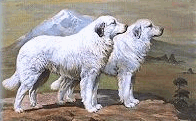GPCA Funded Project – Dwarfism Marker 2020 Final Report ![]()
Dwarf Marker Project 2020 Final Report ![]()
Dwarfism in the Great Pyrenees & The Dwarf Marker Project
with UC Davis School of Veterinary Medicine
Lead Contact: Peggy Watson Pyrstaf@aol.com
July 2009 – Dwarf Study Update
The research team headed by Dr. Neff at UC Davis recently reported that a sufficient sample of affected Pyrs (n=17) were investigated and all showed a deletion in the same region of the genome wide scan. This single locus with high statistical significance was not present in any of the control animals scanned. The researchers are proceeding with fine scale mapping of the region of interest. Within that region a marker has been identified that had a null allele perfectly identified with the defect. Currents efforts are underway to map the breakpoints of the deletion and identify genes that are affected by the mutation. It is likely that this mutation is specific to Great Pyrenees. It is hoped that the fine mapping of the breakpoints of the deletion will lead to the identification of the specific gene(s). If that happens, a DNA test can be developed. However, it is also possible that a specific gene(s) will not be clearly identified and more analysis will be required before specific gene(s) are identified.
Currently the source of funding for the study is intramural monies made available from the Veterinary Genetics Laboratory at UC Davis.
As they proceed with this fine mapping they continue to request samples form unaffected control animals and will certainly welcome any samples from newly identified affected Pyrs. Cheek swab samples are sufficient and instructions can be secured by clicking on the link above.
April 2007 – Dwarf Study Update
In late April, Dr. Mark Neff’s laboratory at UC Davis reported the achievement of an important milestone in understanding the genetic basis of dwarfism in Great Pyrenees. The research team had recently compared the DNA profiles of affected Pyrs (n=12) and unaffected control dogs (n=19), and they found a DNA marker that is highly correlated with the defect. Each of the affected dogs were uniform at the marker on chromosome 33, whereas none of the unaffected dogs had the same genetic signature. The probability of obtaining this result by chance is less than 0.000001 (for context, p < 0.05 is the typical threshold for a significant finding in biological research).
For the laymen among us, the result means two things. First, it supports the prediction that dwarfism in Pyrs is controlled by a single gene acting recessively (hence two copies of the mutation are needed for a dog to be affected). All affected dogs had two copies of the DNA marker. Second, the progress substantially reduces the problem of identifying the causative mutation (from 2.4 billion letters of DNA to slightly less than 2 million letters).
To identify the individual gene responsible for dwarfism, the researchers at UC Davis hope to collect additional samples from affected and unaffected dogs. Their target is DNA from an additional 10 affected dogs (to essentially double the power of the mapping approach).
Please contact Peggy Watson if you know of any dwarves or unaffected dogs from which blood or cheek swab samples can be collected. Peggy has the submission information for blood samples and has swabs for the cheek collections. You can reach her at pyrstaf@aol.com.
UC Davis is underwriting the blood collections at $15 per dog and is providing free shipping of the samples. To insure that no one will be unable to submit samples because of cost, the GPCA BOD has authorized reimbursement for costs beyond the $15 allocated by UC Davis.
With our help, the researchers have taken an exciting first step toward a DNA test that would allow us to eliminate dwarfism from the Pyr gene pool. Let’s continue to support the research by providing the much needed DNA samples. This will in turn allow the research team at UC Davis to progress the study to a successful conclusion, and ultimately ensuring the health of our dogs.
January 2007
The members of the GPCA Health Committee are pleased to announce the start of an initial project to search for a genetic marker for the cause of dwarfism in Great Pyrenees. Dr. Neff at UC Davis will be conducting the research and Peggy Watson is the GPCA contact person for this project. The HC recommended the project and funding to underwrite the collection of samples to the GPCA BOD. We are pleased to report that the motion passed the BOD unanimously.
Recent advances in genetic research allow Dr. Neff to proceed with a study based on three groups: one group of affected Pyrs (dwarves), a second group of Pyrs related to the dwarves, and a third group of non related Pyrs. Participants have been identified and contacted. More detailed information will be provided in an upcoming article that will be posted on the website and in the Bulletin.
This is an important beginning to a question that has been concerning GPCA members and breeders for many years. We hope that once a marker is found that it will lead to the development of a simple screening examination that will assist breeders in planning their litters to prevent this problem that has existed in our breed for generations.
We are quite excited about this opportunity.
Flo Laicher, HC Chairman
Please check back for detailed information.


